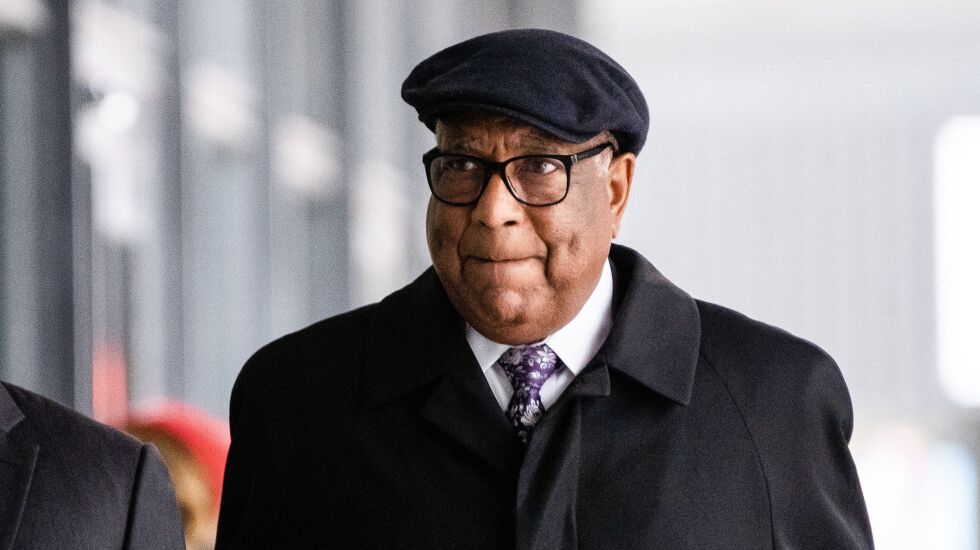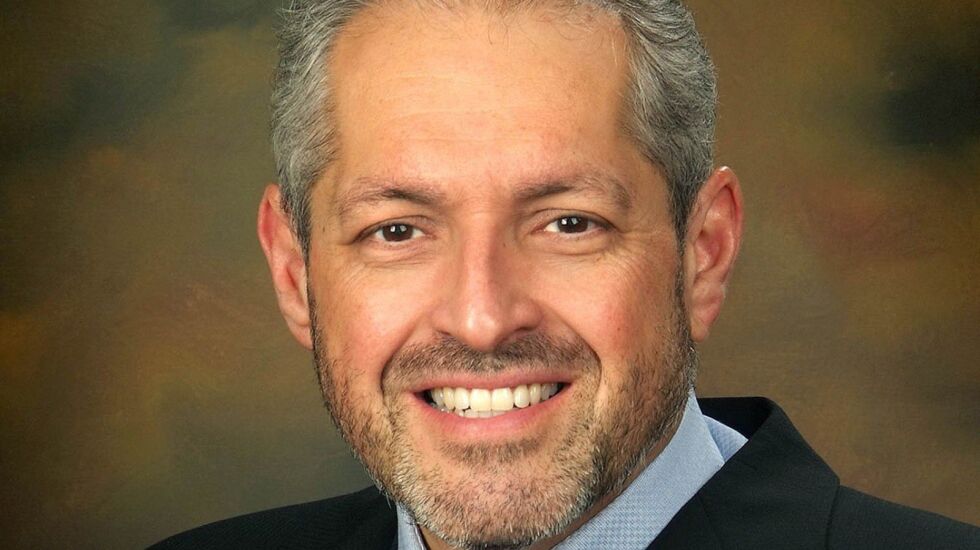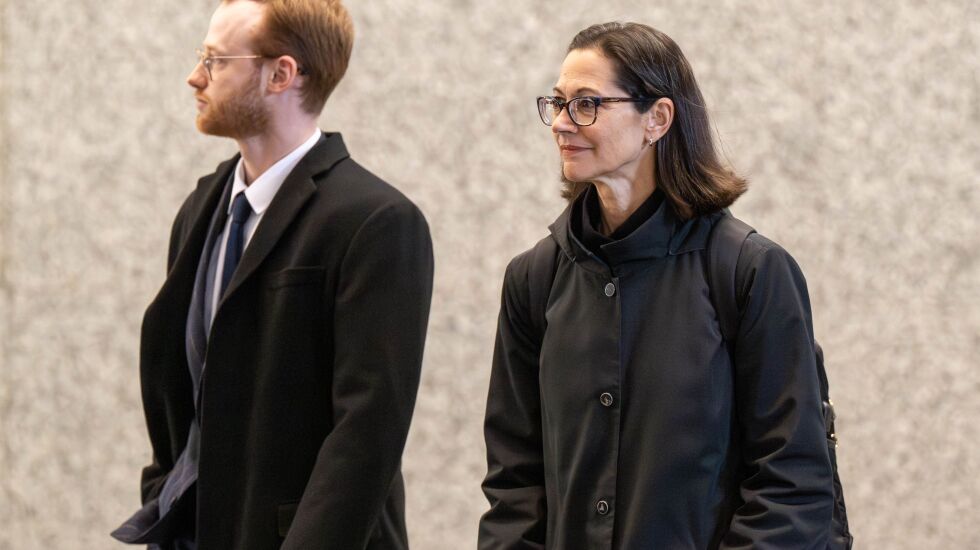
Closing arguments are expected to begin Monday in the trial of four political power players accused of conspiring to bribe former Illinois House Speaker Michael Madigan, meaning the expansive case that shook state politics will soon be in the hands of a jury.
Jurors will have a mountain of evidence to sort through once they begin to deliberate. Not only did they hear from about 50 witnesses over five weeks, they have seen piles of emails and heard a cache of secret FBI recordings that form the backbone of the feds’ case.
Before U.S. District Judge Harry Leinenweber sent them home for the week, they watched for a second consecutive day Wednesday as a federal prosecutor cross-examined one of the four defendants.
Former ComEd lobbyist John Hooker told the jury he never set out to corruptly influence Madigan. In fact, he said he didn’t believe Madigan would trade support for a bill in exchange for jobs for his allies.
On trial with Hooker are Madigan confidant Michael McClain, former ComEd CEO Anne Pramaggiore and onetime City Club President Jay Doherty. They are accused of a nearly decade-long bribery conspiracy, in which they allegedly arranged for jobs, contracts and money for Madigan allies.
Prosecutors said they did so in an illegal bid to sway Madigan as legislation moved through Springfield, taking ComEd from a “dire” financial position in the 2000s to record earnings in 2022.
At the core of the case are five Madigan allies paid $1.3 million by ComEd through a contract between the utility and Doherty’s consulting firm and other intermediaries, allegedly for do-nothing jobs. Prosecutors have also pointed to an unusual contract for a clouted law firm, and the appointment of former McPier boss Juan Ochoa to the ComEd board in 2019.

Attorneys for the four defendants have insisted their clients are guilty of nothing more than honest, legal lobbying. And during opening statements March 15 at the Dirksen Federal Courthouse, they told jurors the prosecutors’ “dark theory” would finally “be put to the test.”
Since then, jurors have heard how former state Rep. Lou Lang was told to resign by McClain, allegedly acting as an agent of Madigan. They heard current state Rep. Robert “Bob” Rita say that Madigan ruled his chamber “through fear and intimidation.” They heard testimony from elusive former Madigan aide Will Cousineau and top precinct captain Edward Moody.
They watched as a parade of FBI agents explained how they fanned out to raid the homes of Madigan allies, struggling to find evidence that they ever did any work for ComEd. And they saw FBI cooperator Fidel Marquez share undercover recordings he made — including in Springfield political haunt Saputo’s restaurant — before being grilled by defense attorneys.
The ComEd bribery trial is the first of several major public corruption trials set to take place in Chicago’s federal courthouse over the next year, potentially culminating with Madigan’s racketeering trial on April 1, 2024.
Madigan is accused in his indictment of the same scheme at issue in the current trial, in addition to other allegations. So not only has this trial served as a preview of the case against Madigan, the verdict could potentially have ramifications for the former speaker’s trial.
Regardless, the case already helped end his record-breaking grip on power in the Illinois Capitol. Madigan gave up the speaker’s gavel two months after a grand jury handed up the indictment.
Before Monday’s final round of arguments, lawyers in the case are expected to meet Thursday with Leinenweber to decide how jurors will be told to consider the case. The final instructions — and how well jurors follow them — could be key.
The case will likely turn on questions about whether each of the four defendants knowingly joined the alleged conspiracy, whether they acted with a corrupt intent tied to Madigan’s official actions or duties, and whether they did so in connection to legislation.
The most crucial of the secret tapes heard by the jury were recorded by Marquez, who was then a ComEd executive. FBI agents approached Marquez on Jan. 16, 2019 and convinced him to cooperate in their investigation. He has pleaded guilty to bribery conspiracy and has not been sentenced.

In the recordings made by Marquez and in other federal wiretaps, each of the four defendants can be heard discussing the arrangement through which ComEd paid Madigan’s allies, including Moody, former Alds. Frank Olivo and Michael R. Zalewski, former state Rep. Edward Acevedo and Raymond Nice.
Hooker and McClain could be heard chatting on Feb. 11, 2019 about how they had conceived the arrangement, with Hooker saying, “It’s clean for all of us.”
“We had to hire these guys because Mike Madigan came to us … It’s that simple,” McClain said.
In a meeting two days later, Marquez spoke with Doherty and asked him what work the subcontractors did for him. Doherty answered, “Not much.” He went on to tell Marquez that “my bottom line advice would be, ‘If it ain’t broke, don’t fix it’ with those guys.”
In a Feb. 18, 2019 phone call, Marquez told Pramaggiore that he’d learned from Doherty that “all these guys do is pretty much collect a check.” She advised him to “make a switch,” but also told him to wait until the end of the legislative session. She said they didn’t want someone to get “their nose out of joint,” meaning ComEd would be forced to give someone a “five-year contract because we’re in the middle of needing to get something done in Springfield.”

Pramaggiore took the stand earlier this week and insisted she didn’t realize Marquez was talking about people tied to Madigan. She said the call actually “proves my innocence.”
Finally, in a Feb. 27, 2019 meeting between Marquez, McClain and Hooker, Marquez asked how “our friend” — meaning Madigan — might react to the end of the arrangement.
Hooker responded by saying, “You’re not gonna do it? You’re not going to do something for me, I don’t have to do anything for you.”
Hooker followed Pramaggiore to the witness stand Tuesday. And Wednesday, Assistant U.S. Attorney Julia Schwartz had her chance to cross-examine him. She asked Hooker about his comment during the Feb. 27, 2019 meeting with Marquez and McClain.
Hooker told her he was confused during the conversation and actually thought Marquez was asking him how Madigan might react to a labor dispute.
Schwartz also asked Hooker about a recorded phone conversation he had with McClain on April 24, 2018. It revolved around Madigan’s alleged recommendation that Zalewski be added as a subcontractor to Doherty’s contract.

Olivo and Nice were already subcontractors, and Hooker told McClain “that has paid off for us in the past.”
Though Hooker was involved in adding Olivo and Nice to Doherty’s contract, he told Schwartz he never gave them assignments and was not aware of any work they’d done for ComEd.
“What about their work paid off in the past?” Schwartz asked.
“The mere fact that they were hired and we honored a request and that they could work for ComEd and perform the duties that ComEd needed,” Hooker told her.







